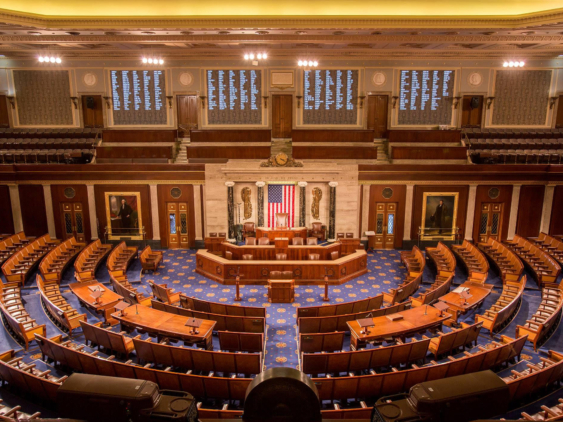This week marks CAE’s third anniversary as an organization – and what a remarkable 36 months it has been.
For starters, we’ve survived, no small feat for any new organization, and perhaps especially for a nonpartisan research, policy, and advocacy group – a unique profile that doesn’t fit neatly into any of the standard organizational categories that are easier to fund. We are profoundly grateful to our funders for sharing our vision and believing in us – in particular, the Ewing Marion Kauffman Foundation, the Case Foundation, Schmidt Futures, Visa, Wells Fargo, Goldman Sachs, Fidelity, Intuit, and many generous individuals.
Even more remarkable is what CAE has accomplished in just 36 months. It’s easy to forget the details, so I decided to collect in one easily reviewable place CAE’s major activities and accomplishments – with hotlinks to the underlying reports, documents, blog posts, legislation, and press releases – since we launched in July of 2017.
It’s worth underscoring that the summary below does not include the hundreds of meetings with policymakers and their staff conducted by CAE’s team, which is the hard, day-to-day work of trust-establishment and relationship-building that makes the achievements listed below possible and most impactful.
Sincere thanks to the members of our remarkable Advisory Council and Board of Directors for their time, energy, expertise, guidance, and support for what was, in July of 2017, more of an idea than an organization. No part of what follows could have been accomplished without all of them. And very special thanks to our first two board chairs – Blake Patton, CAE’s first chair, and Rebecca Lovell, our current chair – for their leadership and critical contribution to CAE’s success to date.
Finally, my thanks to CAE’s day-to-day team that makes all we do happen: Al Simensky, Chris Walling, Kevin Ross, Sheila Herrling, and most especially, Katie Allen, my partner in crime who took the personal and professional risk to launch CAE with me three years ago.
Simply put, in our first three years underway, we’ve succeeded in raising entrepreneurship to the very highest levels of policymaking in Washington, DC, despite very challenging conditions.
With an Entrepreneurship Caucus now established and active in both chambers of Congress – for the first time ever – several pieces of major legislation pending (e.g., the Endless Frontier Act and New Business Preservation Act), and many other projects and initiatives under way, CAE has created an unprecedented opportunity to make progress on a wide range of issues critical to American entrepreneurs and startups as never before, with the aim of building a stronger, more resilient, and more inclusive U.S. economy.
Research
- December 4, 2017: CAE releases “Immigrant Founders of the Fortune 500” by research director Ian Hathaway. The analysis shows that 43 percent of Fortune 500 companies were founded by a first- or second-generation immigrant, are headquartered in 68 cities in 32 states, and employ millions of Americans.
- February 5, 2018: CAE and the Brookings Institution release “High Growth Firms and Cities in the United States,” an analysis of the defining characteristics of the Inc. 5000 (fastest growing) companies, 2011 to 2017, by research director Ian Hathaway.
- July 31, 2018: CAE releases “America’s Rising Startup Communities,” an analysis of the geographic distribution of first-round venture capital financing of early-stage startups by research director Ian Hathaway.
- October 5, 2018: CAE releases “The Rise of the Global Startup City: The New Map of Entrepreneurship and Venture Capital,” an analysis of the global distribution of venture capital by research director Ian Hathaway and economist Richard Florida. The analysis shows that “America’s once-singular dominance is now being challenged by the growth of potent startup cities in Europe, China, India, and elsewhere.”
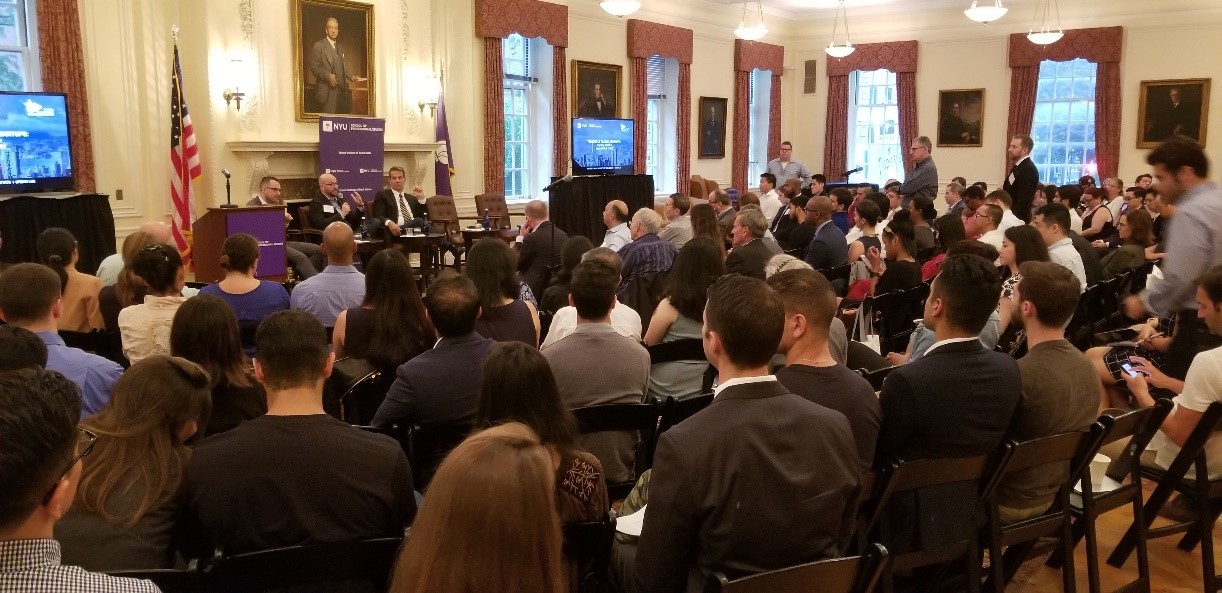
CAE co-founder and board member, Ian Hathaway, presents with co-author, economist Richard Florida, at NYU Law School regarding their report “The Rise of the Global Startup City: The New Map of Entrepreneurship and Venture Capital,” October 5, 2018.
Policy & Advocacy
- October 3, 2017: CAE president John Dearie testifies before the Joint Economic Committee of Congress regarding tax reform and entrepreneurship.
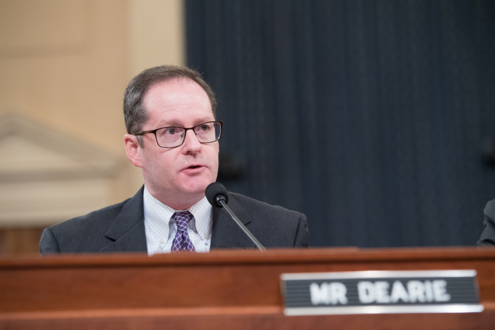
CAE president John Dearie testifies before the Joint Economic Committee, October 3, 2017.
- June 22, 2018: CAE submits a letter of comment urging the Department of Homeland Security (DHS) to not terminate the International Entrepreneur (IE) parole program.

Senator Jerry Moran (R-KS) chats with Blake Patton, CAE’s board chair, in October 24, 2017.
- July 30, 2018: CAE submits a letter of comment to the National Institute of Standards and Technology (NIST) regarding reform of federal technology transfer processes.
- February 21, 2019: CAE establishes the Entrepreneurship Policy Group, a quarterly meeting of 18 organizations active on entrepreneurship-related issues. The purpose of the quarterly meeting is to share information regarding activities and initiatives, political reconnaissance, and to identify opportunities to coordinate and collaborate.
- March 6, 2019: CAE helps establish the first bipartisan Senate Entrepreneurship Caucus.
- July 23, 2019: With input from CAE, Senators Maggie Hassan (D-NH) and Thom Tillis (R-NC) introduce the Research and Development Tax Credit Expansion Act to expand startups’ ability to apply R&D tax credits to their payroll tax liability.
- September 24, 2019: CAE hosts a Women’s Entrepreneurship Roundtable in Washington, DC with 22 women entrepreneurs from across the United States and members of the Senate Entrepreneurship Caucus.
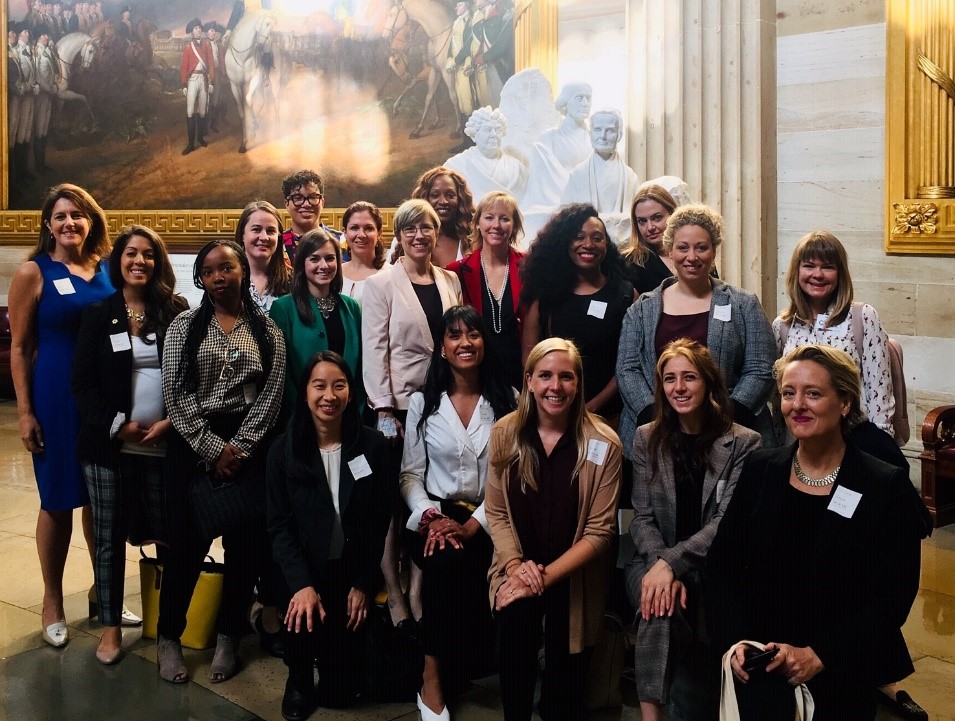
Women founders from all across the country pose before the monument to women’s suffrage pioneers Lucretia Mott, Elizabeth Cady Stanton, and Susan B. Anthony, in the Capitol Rotunda before a roundtable with the Senate Entrepreneurship Caucus, September 24, 2019.
- September 24, 2019: With support and input from CAE, Senate Entrepreneurship Caucus co-chairs Senator Amy Klobuchar (D-MN) and Senator Tim Scott (R-SC) introduce the Enhancing Entrepreneurship for the 21st Century Act, which directs the Secretary of Commerce to conduct a two-year analysis of the decline in new business formation rates, including likely contributing factors and economic implications.
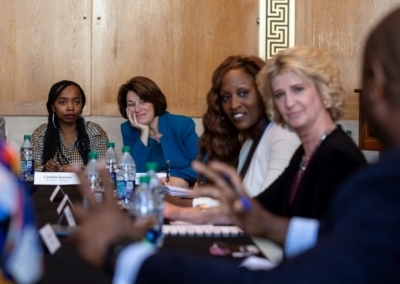
Senator Amy Klobuchar (D-MN), co-chair of the Senate Entrepreneurship Caucus, listens during a CAE-arranged roundtable with women entrepreneurs, September 24, 2019.
- October 2, 2019: CAE helps establish the bipartisan House Entrepreneurship Caucus.
- October 30, 2019: With input from CAE, Senator Ron Wyden (D-OR), Ranking Member of the Senate Finance Committee, introduces the PROGRESS Act, which would improve startups’ access to capital by providing a first employee tax credit and a tax credit for angel investors.
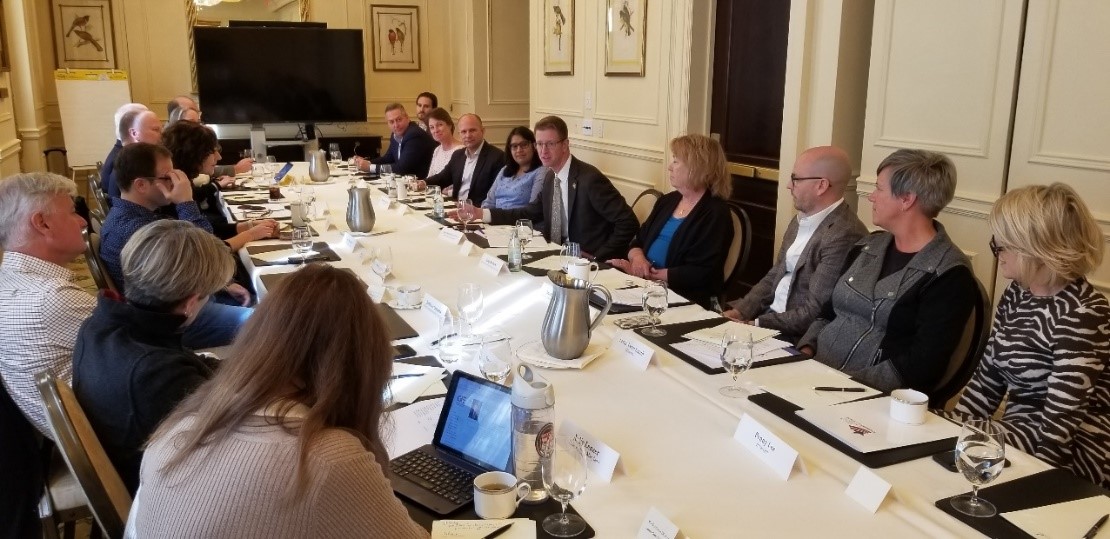
Members of CAE’s board of directors hear from Rep. Derek Kilmer (D-WA), Chairman of the House New Democrats Coalition, October 23, 2019.
- October 31, 2019: The six co-chairs of the new House Entrepreneurship Caucus introduce the Enhancing Entrepreneurship for the 21st Century Act in the House.
- February 5, 2020: CAE hosts a joint staff briefing of the House Entrepreneurship Caucus and the House R&D Caucus regarding implementation by Congress of the tech transfer and commercialization reform recommendations of the April 2019 “Green Paper” released by the National Institute of Standards and Technology (NIST).
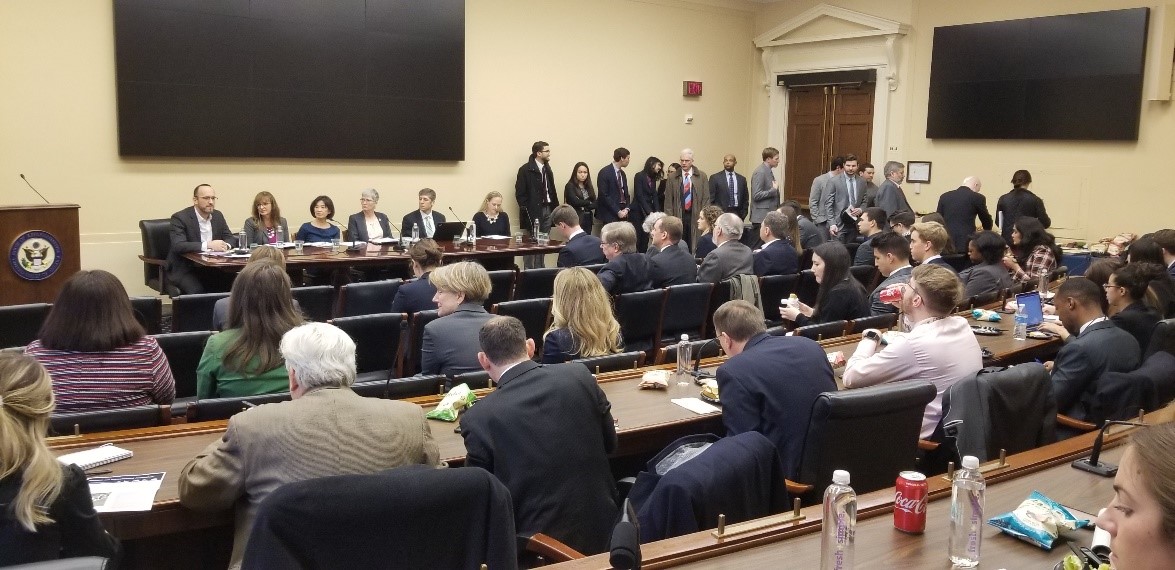
CAE board members Orin Herskowitz and Julie Lenzer (far left and second from left) lead a joint briefing of the House R&D Caucus and House Entrepreneurship Caucus.
- March 18, 2020: With substantial input from CAE, the New Business Preservation Act is introduced in the Senate by Amy Klobuchar (D-MN), Chris Coons (D-DE), Tim Kaine (D-VA), and Angus King (I-ME).
- March 26, 2020: The New Business Preservation Act is introduced in the House by Dean Phillips (D-MN), Terri Sewell (D-AL), Ro Khanna (D-CA), and Tim Ryan(D-OH).
- May 6, 2020: CAE organizes a letter from ten leading entrepreneurship, innovation, and small business organizations to Congressional leadership urging passage of the New Business Preservation Act.
- July 22, 2020: With input from CAE, Senators Mark Warner (D-VA) and Steve Daines (R-MT) introduce the Emergency Portable Benefits for Independent Workers Act to accelerate policy innovation within the states regarding to the provision of portable benefits and enhance worker and entrepreneur mobility.
Publications
- August 17, 2017: CAE publishes the Op/Ed “Robust Immigration is ‘America First’” by president John Dearie and economist Doug Holtz-Eakin.
- December 14, 2017: CAE publishes the Op/Ed “Immigrant Entrepreneurs Are Vital to American Prosperity,” by president John Dearie and research director Ian Hathaway.
- March 25, 2018: CAE publishes the Op/Ed “The Right Way to Address Trade-Related Dislocations,” by president John Dearie and economist Robert Litan.
- July 31, 2018: CAE publishes the Op/Ed “Administration’s Workforce Development Plan is Missing a Critical Component” by president John Dearie.
- October 5, 2018: The Wall Street Journal publishes “Can the U.S. Keep Its High-Tech Edge?” by CAE research director Ian Hathaway and economist Richard Florida.
- February 2, 2019: CAE publishes the Op/Ed “Free Entrepreneurs from Student Debt to Supercharge the Economy” by CAE president John Dearie.
- April 10, 2019: CAE publishes the Op/Ed “An Entrepreneur Visa Can Help America Keep its Competitive Edge” by president John Dearie.
- November 26, 2019: CAE publishes the Op/Ed “Senate Roundtable Showcases the Importance and Needs of Women Entrepreneurs” by president John Dearie.
- December 16, 2019: CAE publishes the essay “New Caucuses in Congress Create Unprecedented Opportunity for American Entrepreneurship” by president John Dearie.
- February 4, 2020: CAE publishes the essay “America’s Long Economic Growth Crisis and Washington’s Awakening (Finally) to the Real Solution – Entrepreneurship” by president John Dearie.
- March 31, 2020: CAE publishes the essay “The New Business Preservation Act and the Tradition of U.S. Federal Government Support for Entrepreneurship and Venture Capital,” by board member Ian Hathaway.
- May 23, 2020: CAE publishes the Op/Ed “Pass the Primary Care Enhancement Act” by president John Dearie.
- June 15, 2020: CAE publishes the Op/Ed “In Next Covid-19 Bill, Target Innovation and Entrepreneurship” by president John Dearie and Rustin Finkler of Village Capital.
Roundtables
To keep in close touch with America’s entrepreneurs and the issues, priorities, and challenges that matter most to them, CAE staff conducts regular roundtables with entrepreneurs in cities and towns across the United States. In our first 36 months, CAE staff has conducted 18 roundtables.
- Orlando, FL
- Durham, NC
- Seattle, WA
- Richmond, VA
- Memphis, TN
- Madison, WI
- Ann Arbor, MI
- El Paso, TX
- New York, NY
- Tucson, AZ
- Chicago, IL
- Detroit, MI
- South Bend, IN
- Portland, OR
- Grand Rapids, MI
- Charlottesville, VA
- Omaha, NE
- Raleigh, NC

Entrepreneur roundtable at Start Garden in Grand Rapids, MI, January 2019.
